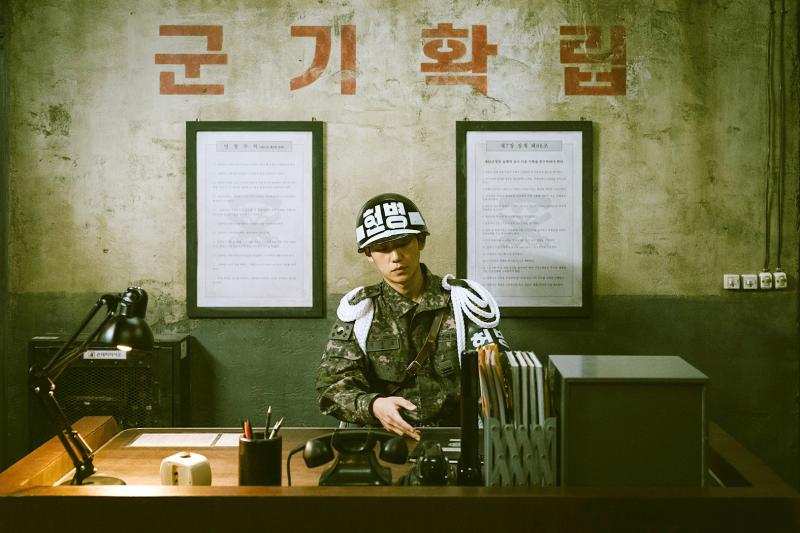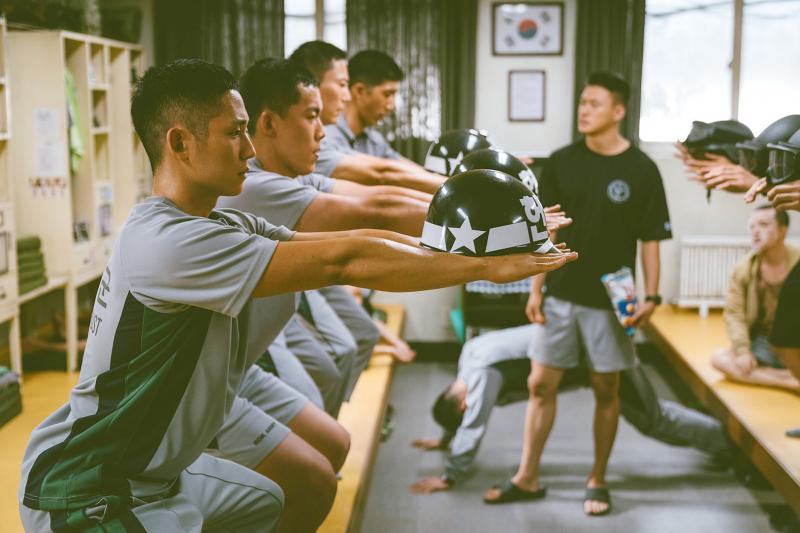A hit Netflix series is reigniting a debate in South Korea over the country’s massive military, its history of abuse scandals, and the mandatory conscription that fills its ranks with young men.
D.P., short for Deserter Pursuit, has been among the top Netflix shows in South Korea since it premiered at the end of August.
The series follows military police assigned to capture deserters, shining a light on daily life for many conscripts, including mental and physical abuse from other soldiers.

Photo: Reuters via Netflix
Director Han Jun-hee said he sought to tell a humanising story about how the system makes deserters both victims and criminals, as well as the toll it takes on those forced to do the hunting.
“D.P. is a story of tracing a deserter, but at the same time, it is a paradoxical story of looking for someone’s unfortunate son, brother, or lover,” Han said.
Asked about the popularity of the show, a defense ministry spokesman said that the military environment has changed and that the ministry has tried to stamp out abuse and harsh treatment.

Photo: Reuters via Netflix
Last week the military announced that even before the series came out, it had planned to do away with the system of having rank-and-file soldiers track down AWOL comrades. That change will go into effect in July next year.
South Korea maintains an active duty military of 550,000, with 2.7 million troops in reserves, amid decades of tensions with North Korea. All men must serve for up to 21 months, depending on the military branch.
South Korea’s military criminal law punishes desertion by up to 10 years in prison.
The Defense Ministry says abuse and desertion among conscripts are down, largely because of a 2019 decision to allow enlisted soldiers to use cellphones in their barracks.
The ministry declined to confirm the exact number of deserters, but South Korean media reported that 55 cases were reported last year, down from 78 in 2019. Military deaths by suicide also dropped from 27 to 15 in the same period.
HEATED DEBATE
The series landed as the country debates the future of conscription and the potential for abuse, particularly as young men facing dim economic prospects have complained of losing time to military service that they could have spent on studies or work.
In 2018 a Supreme Court ruling for the first time found that conscientious objection is a valid reason to forgo military service. Parliament last year passed a bill allowing K-Pop stars to postpone their military service to when they are 30.
The military has been rocked by multiple sexual abuse scandals this year, prompting lawmakers to pass a law that sex abuse and violent crime in the military will be handled by civilian courts.
Reaction to the series among former conscripts has been mixed, with some saying it mirrored their experiences, others saying its depictions of abuse are overblown, and some avoiding the show altogether to prevent traumatic memories from resurfacing.
“There is a scene in D.P. where they throw combat boots (at the soldier). I went through a lot of similar harassments,” said Ma Joon-bin, who described his time between 2013 and 2014 as the “dark ages.” “Now that I look back I feel it was unfair, but back then it was so common.”
Lee Jun-tae, 24, who served from 2017 to 2019, said he had never experienced or heard of any of his friends suffering abuse during their service.
“There was no harsh treatment during my time,” he said.
Last week the presidential favorite for the ruling party, Lee Jae-myung, called the stories in the series a “barbaric history” of South Korea. Hong Joon-pyo, an opposition party candidate, has said he endured cruelty as a soldier and pledged to consider moving to voluntary military service.
Ending conscription won’t solve all the problems if broader military culture doesn’t change as well, said pop culture critic Kim Hern-sik, who served as a D.P.
“As long as there is military service, whether mandatory or voluntary conscription system, problems are inevitable one way or another,” Kim said.

On April 26, The Lancet published a letter from two doctors at Taichung-based China Medical University Hospital (CMUH) warning that “Taiwan’s Health Care System is on the Brink of Collapse.” The authors said that “Years of policy inaction and mismanagement of resources have led to the National Health Insurance system operating under unsustainable conditions.” The pushback was immediate. Errors in the paper were quickly identified and publicized, to discredit the authors (the hospital apologized). CNA reported that CMUH said the letter described Taiwan in 2021 as having 62 nurses per 10,000 people, when the correct number was 78 nurses per 10,000

As we live longer, our risk of cognitive impairment is increasing. How can we delay the onset of symptoms? Do we have to give up every indulgence or can small changes make a difference? We asked neurologists for tips on how to keep our brains healthy for life. TAKE CARE OF YOUR HEALTH “All of the sensible things that apply to bodily health apply to brain health,” says Suzanne O’Sullivan, a consultant in neurology at the National Hospital for Neurology and Neurosurgery in London, and the author of The Age of Diagnosis. “When you’re 20, you can get away with absolute

May 5 to May 11 What started out as friction between Taiwanese students at Taichung First High School and a Japanese head cook escalated dramatically over the first two weeks of May 1927. It began on April 30 when the cook’s wife knew that lotus starch used in that night’s dinner had rat feces in it, but failed to inform staff until the meal was already prepared. The students believed that her silence was intentional, and filed a complaint. The school’s Japanese administrators sided with the cook’s family, dismissing the students as troublemakers and clamping down on their freedoms — with

As Donald Trump’s executive order in March led to the shuttering of Voice of America (VOA) — the global broadcaster whose roots date back to the fight against Nazi propaganda — he quickly attracted support from figures not used to aligning themselves with any US administration. Trump had ordered the US Agency for Global Media, the federal agency that funds VOA and other groups promoting independent journalism overseas, to be “eliminated to the maximum extent consistent with applicable law.” The decision suddenly halted programming in 49 languages to more than 425 million people. In Moscow, Margarita Simonyan, the hardline editor-in-chief of the